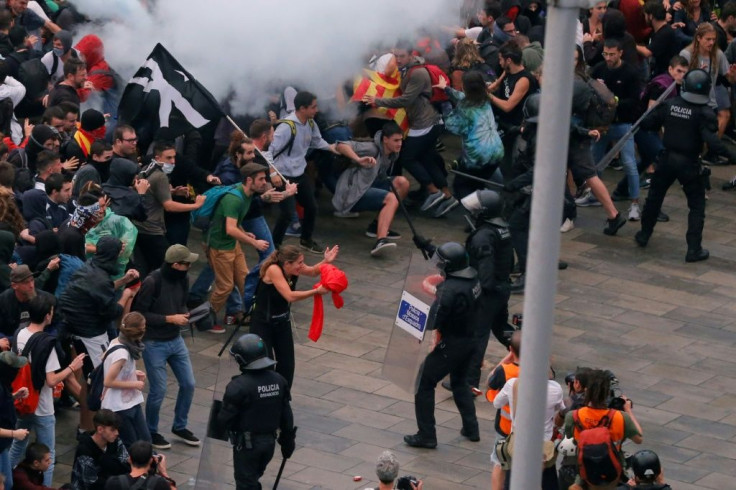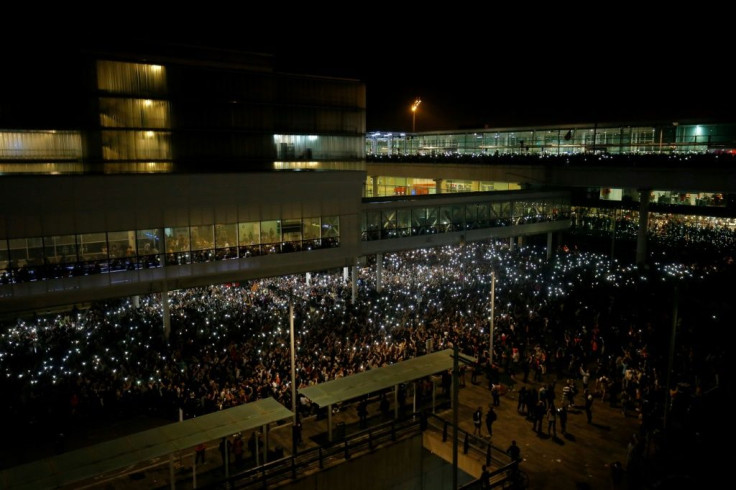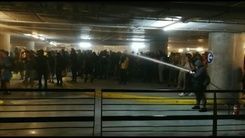Fresh Protests In Spain Over Catalan Sentence

Catalan separatists on Tuesday blocked streets and train tracks in protest against Spain's jailing of nine of their leaders, as the Spanish government hit out at what it called "generalised violence" a day after activists stormed Barcelona airport.
Pro-independence groups staged sit-ins outside Spanish government offices in a number of Catalan cities late Tuesday, with around 40,000 people taking part in Barcelona and 9,000 in the separatist stronghold of Girona, according to municipal and regional police.
"It is evident that what we're facing is not a peaceful movement but one orchestrated by groups using street violence to destroy co-existence in Catalonia," the government said in a statement.
"This evening's violence (in cities such as Barcelona, Tarragona, Girona and Lerida) was generalised," the statement said.
Several roads were cut across the northeastern region, including the AP-7 which links Barcelona to France, local officials said.
In Barcelona, police charged hundreds of masked demonstrators who threw projectiles at officers and lit fires. Three people were arrested, police said.
More flight cancellations
In Monday's protests at the city's El Prat airport, coordinated by the group Democratic Tsunami, activists engaged in running battles with riot police as they sought to enter the terminal.
But they were repeatedly rebuffed, with police staging multiple charges and firing foam and rubber bullets into the crowds in a stand-off which forced the cancellation of 110 flights, airport officials said.

Although life was slowly returning to normal at the airport after a night in which hundreds of people were stranded at the terminal, another 45 flights were cancelled on Tuesday morning, Spanish airport authority AENA said.
"What the demonstrators are saying is... that putting people in prison won't resolve anything," the independent speaker of the Catalan parliament, Roger Torrent, told AFP.
What was needed was "to sit down, talk and find a democratic solution," he said, insisting that the aim of the pro-independence movement was to force Madrid to negotiate a self-determination referendum.
Catalan separatists were enraged by the Supreme Court's decision on Monday to hand heavy prison sentences of between nine and 13 years to leaders convicted of sedition over the 2017 referendum and short-lived declaration of independence.

The emergency services said 131 people were injured in Monday's protests, 115 of them at the airport, with the rest in Barcelona and elsewhere. One protester sustained a serious eye injury "compatible" with a police projectile, hospital officials said.
Democratic Tsunami
The separatist movement has made clear there will be no let-up in their protests over the verdict which came as Spain counts down to a November 10 general election, its fourth in as many years, putting the Catalan question at the heart of the political debate.
Around 10,000 people took part in the demonstration at the airport, according to the interior ministry.
Many people took the day off to join the protests, heeding widespread calls on social media to "Turn Catalonia into the new Hong Kong" and raise international awareness of the crisis in this wealthy northeastern region of Spain. Hong Kong has been rattled by weeks of pro-democracy street protests.
"For me, the worst thing is Europe, which hasn't said anything. That's why we're doing this, to cause the worst possible disturbance, so it affects everyone, to see if they realise and do something," IT consultant Carles Navarro told AFP.
"We have always chosen peaceful ways (of fighting for what we believe in) but nobody listens. Now we're forced to go down the route of civil disobedience."
Spanish Interior Minister Fernando Grande-Marlaska said investigators were trying to identify those behind Democratic Tsunami.
"I have no doubt we will end up finding out who's behind Democratic Tsunami," he told Spain's RNE public radio.
'Contradiction'
Spain's government has expressed hope the trial's end would allow it to move on from the crisis in Catalonia, where support for independence has gained momentum over the past decade.
But the Catalan separatists, who control the regional government and last month passed a motion in their parliament granting legitimacy to civil disobedience, have shown little willingness to talk.
This "contradiction" is "one of the difficulties of this process," Torra said Tuesday.
In the coming days, protesters are planning to stage marches from five Catalan towns towards Barcelona where they will gather on Friday, when unions have called a general strike. Students are also planning to rally in Madrid on Wednesday.
© Copyright AFP {{Year}}. All rights reserved.





















